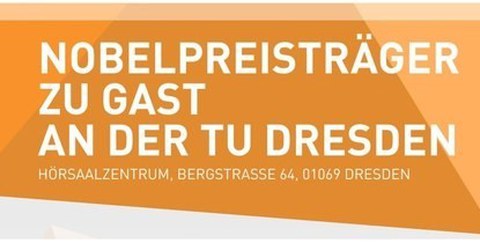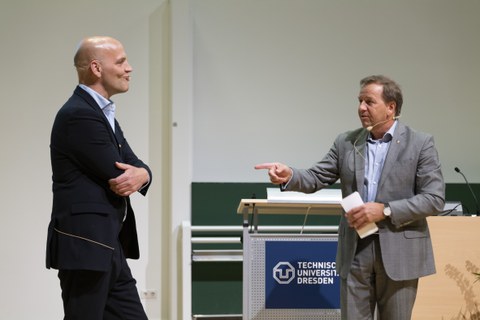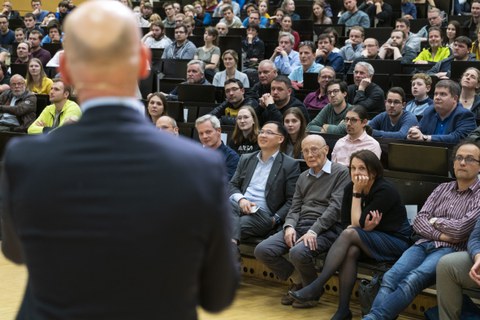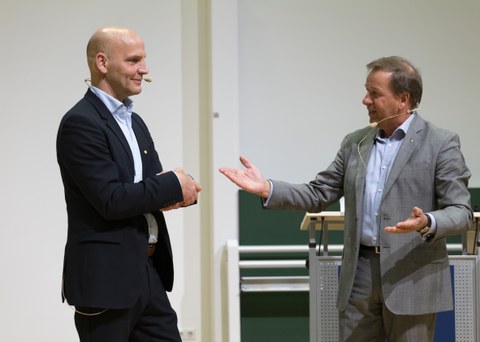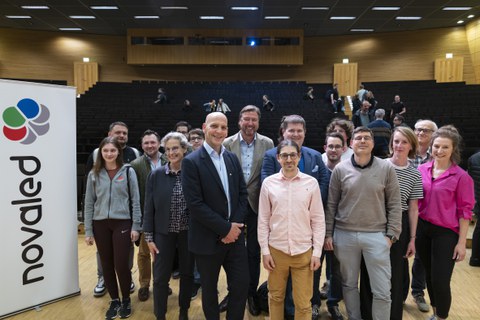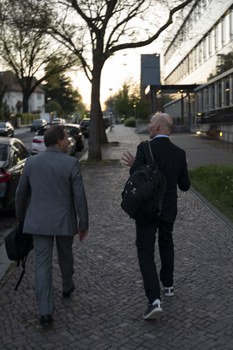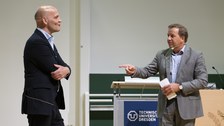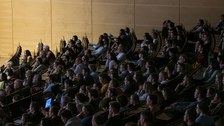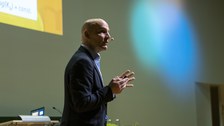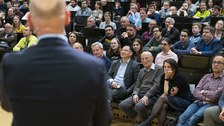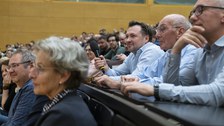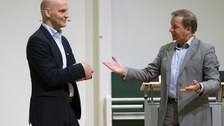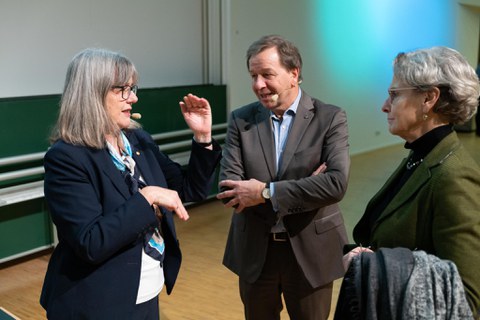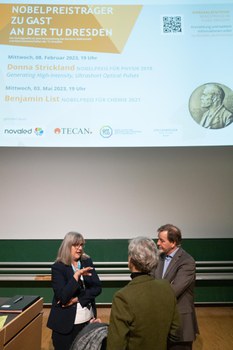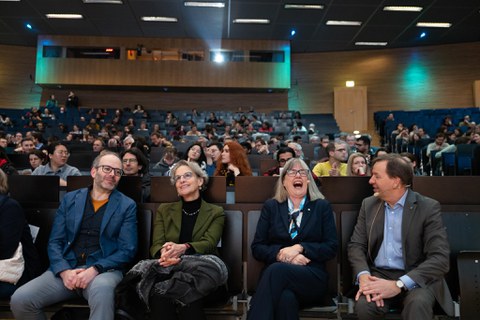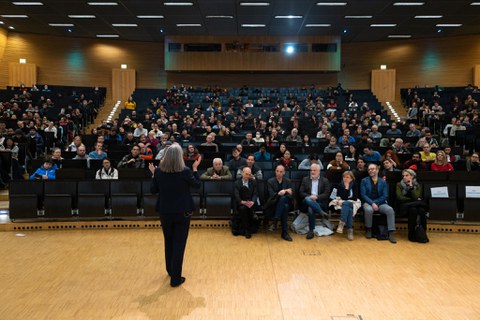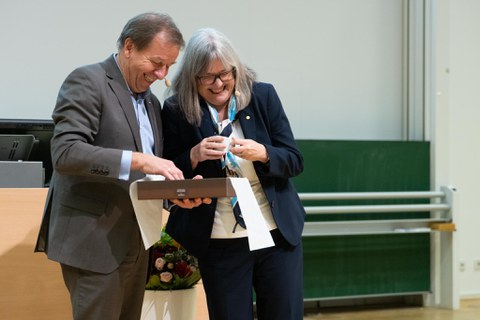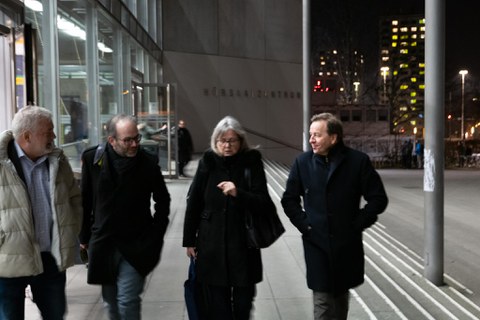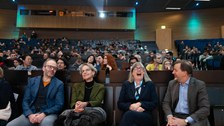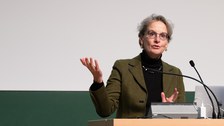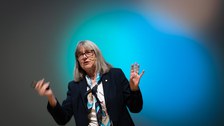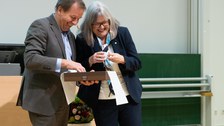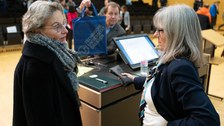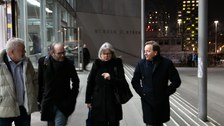Nobel Laureates lecture series 2023
We would especially like to thank our partners for supporting the lecture series:
Novaled GmbH, Tecan, Hotel Taschenbergpalais Kempinski Dresden, Gesellschaft von Freunden und Förderern der TU Dresden and Steigenberger Hotel de Saxe Dresden.
Table of contents
Benjamin List
Nobel Prize in Chemistry 2021
Public lecture: Katalyse für die Welt (lecture held in German, "Catalysis for the world")
Wednesday, 03 May 2023, 7 p.m.
Audimax, TU Dresden
Benjamin List was born in Frankfurt am Main in 1968. He studied chemistry at the Free University of Berlin and received his PhD from the Goethe University in Frankfurt (1997, Prof. G. Mulzer). He worked as a postdoctoral fellow at the Scripps Research Institute in La Jolla/United States from 1997 to 1998 and as an assistant professor from 1999 to 2003. In 2003, he moved to the Max-Planck-Institut für Kohlenforschung in Mülheim/Ruhr as head of a research group and became one of the directors there in 2005. He still holds this position today. He also heads a research group at Hokkaido University in Japan and is an honorary professor at the University of Cologne. List has been awarded dozens of prestigious prizes in the field of chemistry. In 2021, he received the Nobel Prize for his work on asymmetric organocatalysis. Benjamin List lives in Mülheim Ruhr, he is married and father of two grown-up sons.
Catalysis for the world
With his research group at the Max-Planck-Insitut für Kohlenforschung, Chemistry Nobel Prize Laurates Benjamin List aims towards the invention of new strategies for the development of “perfect chemical reactions”. For him, the science of catalysis is truly fascinating. To design a catalyst – by providing a lower energy pathway to convert substrates into the desired product – is as close as chemists can ever come to magic. Providing this lower energy pathway without being used up enables us to use a very small amount of a catalyst to convert large amounts of starting materials into a useful product. And there is so much more to it. Catalysis is not only a beautiful concept; it is a very important technology. Some would state that it is the most important technology for humankind on this planet. It is estimated that catalysis contributes to roughly one third of the GDP – which means figures in the trillions. There is probably no other technology that can claim to feed, to heal, to warm and to transport humans and their goods. The challenges humanity faces right now – global warming, energy conversion – will be addressed with the help of catalysis. In his talk, Benjamin List will speak about the catalysis with organic molecules and how strong and confined acids could become universal catalysts.
Donna Strickland
Wednesday, 8 February 2023, 7pm
Audimax, TU Dresden
Public lecture: Generating High-Intensity, Ultrashort Optical Pulses
Donna Strickland
*27 May 1959, Guelph, Ontario, Canada University of Waterloo
Nobel Prize in Physics 2018
In 2018, Donna Strickland became the third woman ever, after the German-American Maria Goeppert-Mayer and Marie Curie, to be honored with the Nobel Prize in Physics. In 1985, as a doctoral student at the University of Rochester, Strickland and her supervisor, Gérard Mourou, developed a method for generating ultrashort laser pulses: the so-called chirped pulse amplification (CPA). The process is now used worldwide - for example in laser eye surgery. Donna Strickland published her first research article in her research career on this groundbreaking invention in the field of laser physics and was honored for it with the 2018 Nobel Prize in Physics together with Gérard Mourou and Arthur Ashkin.
In 1997, she joined the University of Waterloo, where her ultrafast laser group develops high-intensity laser systems for nonlinear optics investigations. She was named a 2021 Hagler Fellow of Texas A&M University and sits on the Growth Technology Advisory Board of Applied Materials. Strickland served as the president of the Optica (formerly OSA) in 2013 and is a fellow of Optica, SPIE, the Royal Society of Canada and the Royal Society. She is an honorary fellow of the Canadian Academy of Engineering and the Institute of Physics, an international member of the US National Academy of Science and member of the Pontifical Academy of Science. Strickland was named a Companion of the Order of Canada.

